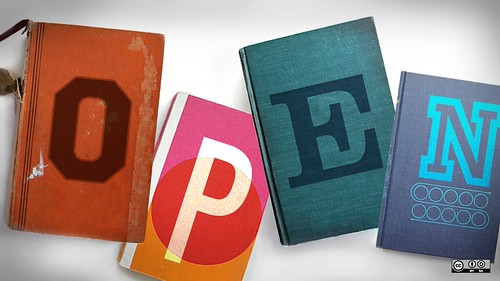
With silver bells, and cockle shells…and pretty maids all in a row! Perhaps that is one way of looking at the wonderful record of professional learning that will come to reside in your online learning record of your Thinkspace blog.
Yes, it could be a beautiful garden, or it could be a collection of weeds with the occasional bright flower. So it is time for me to write a strong reminder of the importance of keeping a clear focus on your personal learning, which is more than just studying and writing assessments. Your learning is about lifting your knowledge to new levels and reaching out to your new professional community to discover the full dimensions that teacher librarianship can offer you.
But blogging first. What have you all been achieving so far in ETL401 with your blogging? There are many many posts written that wonderfully capture the measure of emerging engagement with ideas and interactions with your new knowledge spaces. The confidence that you bring to your writing, however, is not necessarily a natural process for all of you. Don’t let that be a concern. Focus rather on the importance of teacher librarianship. While I am on the topic, a special shoutout to your fellow student Fiona who wrote her first assessment about TLship entitled Would you like an adventure now, or should we have our tea first?
I was so taken by this blog post that I could ‘hear’ Fiona in my head – and contacted her to ask if she would record this blog post for me to share at the ASLA conference as part of my closing keynote. It was indeed the perfect wrap up for the whole conference closing. Thank you Fiona – I was proud of you, and the audience all agreed that her charm and confidence was very special indeed!
More importantly, you are all ready to be fully badged teacher librarians, but you must always and every day extend your knowledge – and blogging is one space where you can do this well, and push yourself to think and record your knowledge.
In particular you need to do this for your subjects and your course.
It really is not enough to just write a few posts, just so that you can write your final blog reflection for a subject. Of course you can ‘get away with it’. But learning is not about, ”getting away with something”. Learning, as you well know, is about pushing the boundaries to know more, to challenge ourselves and others around us. The thing is, for your final subject you are asked to review your learning through all your subjects, and being able to draw on your blog posts is a marvelous way to capture this. Don’t miss the opportunity to start now, get strong in blogging and learning habits, and have a good record as well as build your collaborative knowledge together.
As it happens, too many people have only written one, two or at most three posts.
Gasp!
BUT…………I can also see this much needed curiosity and reflection already happening in the posts that are being written in many other examples such as Tanya, Nicola (with clear use of ETL401 and ETL503 categories), Anastasia, Rebecca (also with good ETL401 and ETL503 categories), and of course Trish who likes to write reams, but whose blog template puzzles me! So if you are only doing one subject, there is still time for you to polish your blogging tools and get going!
Forgot to set up your categories? Just revisit the video we provided in the Introduction module Managing your subjects in Thinkspace.
It’s no surprise that those who write little on their blogs are those who write little or never on the forums. Please know that it is through engaging with the subject, the cognitive stress, pull, strain of the subject, that real learning actually happens. Study is not about content any more – it is all about professional development. A small tip as well. Look at the title of your blog. Does it say “just another CSU Thinkspace blog”, or have you changed the byline? Take a look at Deborah or Donna‘s blogs which all have something else. Donna’s A reflective journal of learning by an aspiring Teacher Librarian is particularly apt!
You set this up in your blog dashboard. Click on Settings > General. See the Tagline under the Site Title? Write yourself a nice tagline right there and you too can have something nicer than “just another CSU Thinkspace blog”.
For more quick tips on blogging, if you need them, take a few minutes to check up the many links provided on the landing page of Thinkspace to look at the many Tools and Resources provided their for you as your blogging habits improve. http://thinkspace.csu.edu.au/.
In addition, here is a very short video with a quick run through some basics for you, as a reminder, if you need it.
Finally, there are a few advanced learners amongst you, who are ready for a bigger challenge. So I wanted to share with you a blog post of one of our graduates who was a champion of both blogging and efficiencies in organisation for study. There was a day when many were asking just HOW to manage everything in a busy day of work, play, and study. Nadine of course was working full time, studying through several Masters degrees, and sharing and building connections all the while. Here was her post in response for the cry for help – which I now share with you. Being organised upfront saves time! Digital reading and studying – teachers are students too. If you are serious about getting organised, you will want to read this! This blog post was subsequently turned into a short contribution to inCite, for ALIA. Nadine is now working in China. Nadine has archived her Thinkspace blog, and continues to blog at https://informativeflights.wordpress.com/
Finally, let me leave you with a final word of encouragement. I received a phone call yesterday morning from a TL, whose first words to me started with “Judy, you won’t remember me, but…..” She graduated six years ago, and despite challenges, continued her study. She is now the keenest advocate and happiest TL in a low socioeconomic area school, ready to tell the world her story. The journey is not always easy. Some of you will find blogging easy. Some of you will not. I found it hard at first, but now it’s second nature.
Give it a go! Start writing, recording, reflecting, challenging, keeping pictures, taking videos, sharing memories…anything. Your students do. You can too.
It was a wonderful opportunity meeting up with current and past students at the recent ASLA conference in Canberra, as well as seeing Lori in person again after only interacting online. Those professional conversations we have at big TL gatherings are well worth it. Keep smiling! Here are my slides for my final presentation, which included the lovely contribution from our student.
Photo by Pixabay on Pexels.com











